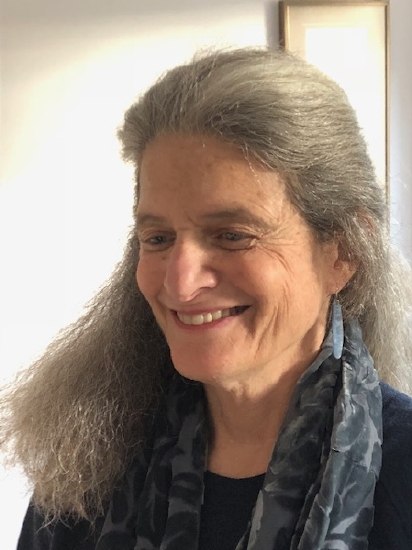
Kate Sontag
Good morning, everyone – and I hope those of you in areas where it’s frigid are able to stay indoors where you can be safe and warm (or hygge, as we’ve learned to say now). I’m always impressed, as you must be, by people who manage to get to work on days like these, still cheerful and smiling, even though they may be worried about how their children are doing when schools are closed.
I met our poet for today, Kate Sontag, only recently, although I’ve had a book of hers on a table close by for many years. Some of you may already know of it: After Confession: Poetry as Autobiograpy, Edited by Kate Sontag and David Graham (Graywolf, 2001). It’s a collection of essays from a number of the best-known poets of our day, some of whom, like Colette Inez and Alicia Ostriker, you may have met on the pages of this column. One of the most valuable essays is one I first encountered many years ago: “The Autobiographer’s Lies,” by Andrew Hudgins.
The reason I keep it on hand, more so than other books in my large personal library, is that I consider it one of the most important books about poetry in decades. Note that it came out in 2001, so it has to be one of the most important in the 21st century. If that’s excessive praise, so be it. Although out of print, I understand it’s still available from Amazon and other places.
Now I’m happy to announce that Kate is already at work on a new anthology, this time about, of all things, Hair. Yes, that’s right. She speaks of it jokingly as her “hirsute pursuit,” as she collects poems and poets ready to join it. I can hardly wait, as it should be lots of fun.
So what about Kate herself? Of course she’s a fine poet, as you will soon see. She holds an MFA from the prestigious University of Iowa Writers’ Workshop and was winner of the Ron Bayes Poetry Prize as well as other awards. A multiple Pushcart Prize nominee, her poems have been featured in Valparaiso Poetry Review and published in numerous other journals, such as Prairie Schooner and Crab Orchard Review; in anthologies such as Boomer Girls and Sweeping Beauty (University of Iowa), Villanelles (Everyman’s Library), Cooking with the Muse (Tupelo), and A Poet’s Craft (University of Michigan).
She recently retired from Ripon College and now lives in the Berkshires, in Western Massachusetts. This winter she is teaching a course on “What Makes a Poem” for the Osher Lifelong Learning Institute.
Now, for your February poetry treat, are three interesting poems by Kate Sontag.
—Irene Willis
Poetry Editor
Dog Hymn
— for David Graham
I believe in the moon more than grading.
Who wouldn’t, save for the lonely or dutiful?
Even the late night howlers agree.
Their dog hymn sails from house to house.
Who wouldn’t, save for the lonely or dutiful,
let the stacks rise and topple and drift?
Their dog hymn sails from house to house:
stop grading, stop grading, stop grading.
Let the stacks rise and topple and drift
deep as snow on the weathered desk.
Stop grading, stop grading, stop grading
follows us to bed until we become lamp-blind.
Deep as snow on the weathered desk
a flurry of spectacled comments and corrections
follows us to bed until we become lamp-blind
error-free masters of all gradations of light.
A flurry of spectacled comments and corrections
woos us outdoors to look skyward.
Error-free mistress of all gradations of light
in the dark, she smiles with kindness,
woos us outdoors to look skyward.
The tiniest twig silvers beneath her
in the dark as she smiles with kindness.
She’s easy to praise and please
the tiniest twig. Silvering beneath her,
even the late night howlers agree
she’s easy to praise and please.
I believe in the moon more than grading.
–forthcoming in The Raintown Review
Sickle Moon
I promise he says not to die on you.
We’re driving the dusky highway home,
the moon a minimalist bereft in blue
behind salt flats of clouds. Focused on the few
clear stars, our beachcombing years to come,
he repeats I promise not to die on you
as if voice can secure every watery vow.
We talk in the dark, our windshield a frame
for the moon. Minimalist, bereft in blue
tonight at dinner a recent widow,
a divorcee, and three single men.
I promise he says not to die on you.
How do monogamous bodies ever get through
grief to the uncoupled side of being human?
The moon’s a minimalist bereft in blue,
a whalebone blur, witness for one, then two
of us. He asks, I answer, our worn tires hum.
I promise I say not to die on you,
the moon a minimalist bereft in blue.
Truck, 2012
Nomadic
For days my mother carries
her New Year’s orchid
from room to room, finally
sets the showy greenhouse gift
delivered to her apartment
in a whiteout blizzard
down in the black ceramic
hollow of the fireplace. Instead
of beauty she praises the plant’s
height and health, counts ten
open blossoms and eighteen
buds over the phone to me
as if there are almost too
many leading her to distraction.
All winter they will bloom
on twiggy tropical stalks
like some long gone stubborn
husband who talks and talks
over the peace and quiet
she cultivates. From her bed
against the opposite side of
the wall she still sees his bruised
skin thinned into strange purple
maps, misses politics most, hears
him stumble on slippered feet,
wandering the no man’s land
of her livingroom, tapping his
cane through ash, or is it
snow, forever prying at
the doors to her heart.
Verse Virtual, January 2017
